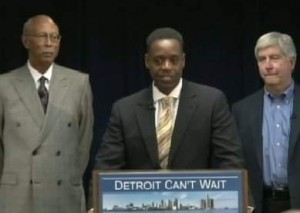Podcast: Play in new window | Download
US State Department’s Office of Guantanamo Closure
The US State Department’s Office of Guantanamo Closure was shut down in January and is now in the process of reopening. President Obama recently appointed Clifford Sloan, a Washington lawyer to run the special envoy. Meanwhile attorney Pardiss Kebriaei has recently returned from the military-run prison in Guantanamo Bay Cuba, and joins us to discuss the conditions there, including the hunger strike. Attorney Pardiss Kebriaei has represented men detained at Guantanamo in habaes corpus challenges.
- CCR represents 8 men still detained at the base right now. We’ve represented dozens, we’ve coordinated the representation of dozens. Some men who’ve been cleared by the Obama Administration, who were cleared in 2009, and 2010, they include men who’ve never been charged, that’s the group we represent.
- There are 166 people who remain, more than half of them 86 have been told by President Obama and his people that they don’t need to be there.
- I met with 3 men, all Yemeni. 2 have been cleared. All of them are on hunger strike.
- It’s shocking to think of how much things have regressed since the strike has progressed.
- In 2008 when I started going down to the base, most people were held in solitary confinement. That is what conditions are again now in 2013. Right now in Camp 6 there are at least 76 men who are sitting in 22 hour a day isolation.
- Recreation time is 2 hours in a cage outside.
- There is also an access to council issue right now. Searches are humiliating, equivalent to being sexually assaulted when they’re moved out of their cells.
- The practice of force feeding is unequivocally a violation of international medical, ethical standards.
- The United States is alone in thinking this in its position that this is a humane and acceptable practice.
- Out of 800 held at Guantanamo, fewer than 2 dozen charged. The rest have all been held without charge.
- Obama pointed the finger at Congress and said Congress determined it would not allow me to close Guantanamo.
- Congress did pass the NDAA in 2011 that would make transfers more difficult but it didn’t take power away from the president.
- It specifically provided a national security waiver provision. Yet Obama has been saying for years because of the NDAA he has been effectively prohibited from transferring anyone and that’s is just not true.
Guest – Attorney Pardiss Kebriaei, she joined the Center Constitutional Rights in July 2007. Since then, her work has focused on representing men detained at Guantánamo Bay in their habeas corpus challenges, before international human rights tribunals, in diplomatic advocacy with foreign governments to secure resettlement for men who cannot return home, and in post-release reintegration efforts. Her clients have included men from Yemen, Syria, Algeria, and Afghanistan. Her work includes seeking accountability for torture and arbitrary detention at Guantánamo.
Past Law and Disorder Interview With Pardiss Kebriaei.
—-
Why Does The City of Detroit Plan To Cut 9 Billion In Retiree Pensions and Healthcare?
The emergency manager of Detroit Kevyn Orr recently announced a plan that would wipe out the pensions and health benefits of all current and retired city workers. The plan eliminates 9 billion dollars in worker benefits, effectively condeming nearly 20 thousand retirees to poverty. Orr is a wealthy Wall Street lawyer who played a key role in restructuring the auto industry carried out by the Obama Administration. Many see this plan as part of the worldwide assault on working class people. How are workers responding to these aggressive cuts? We also listen to Dianne’s presentation at the Left Forum 2013 in New York City.
Dianne Feeley:
- He is attempting shock therapy. Basically he wants to take all of the resources that can be used in Detroit and outsource them and do away with them as in the case of the pensions and health care benefits.
- He suggested to make the city owned art work from the Detroit Institute of Arts available to also be used for this debt which grows by the day. They were talking about 15 billion dollars, now they’re talking about 20 billion.
- The neo-liberals plan is a 3 part plan. First to develop a cheaper and more flexible work force. Meaning reducing pensions, reducing the power of unions.
- The second is transferring public resources into private hands. The third is to appropriate profitable resources. For example we have a lighting department, which has been under funded for 40 years because DTE Energy has tried to prevent development of infrastructure. Now it’s in very bad shape.
- In many of these countries Greece, Portugal, Brazil, there’s a technocrat put in charge in our case its an Emergency Manager.
- More than 50 percent of the African Americans in Michigan have lost their vote through the imposition of Emergency Managers in our cities.
- It’s important to understand we only have 10 thousand city employees left. They’ve already had their pay cut 10 percent.
- Now what they’re trying to do is get rid of the medical care for the retirees.
Guest – Dianne Feeley, retired auto worker who currently serves as an editor of Against the Current, a socialist magazine. She is an advocate for auto workers and has written recently about the U.S. auto industry, arguing that the government should buy Chrysler and General Motors and turn them into a public trust.
——————————————————————–



